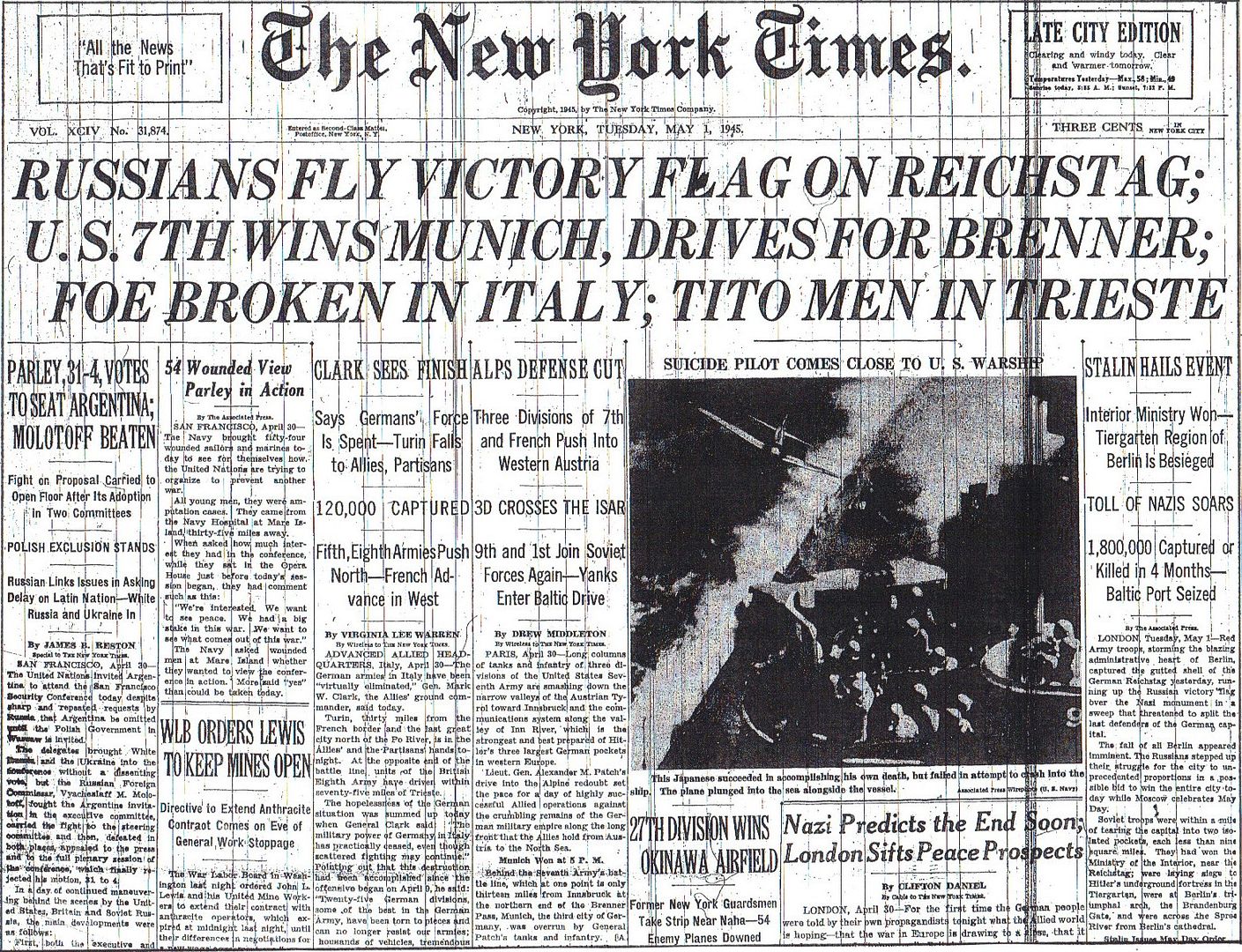
Posted on 05/01/2015 4:20:22 AM PDT by Homer_J_Simpson

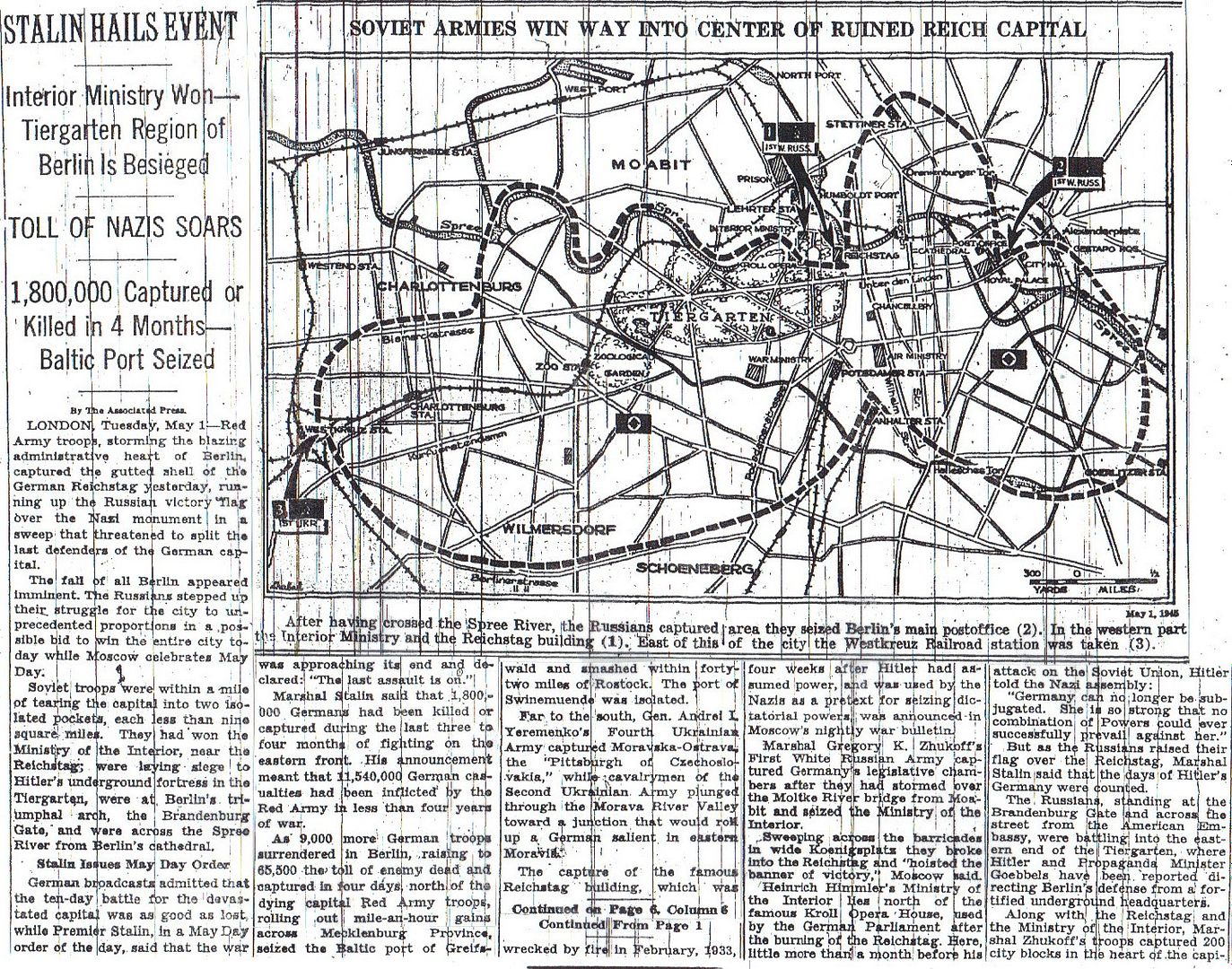
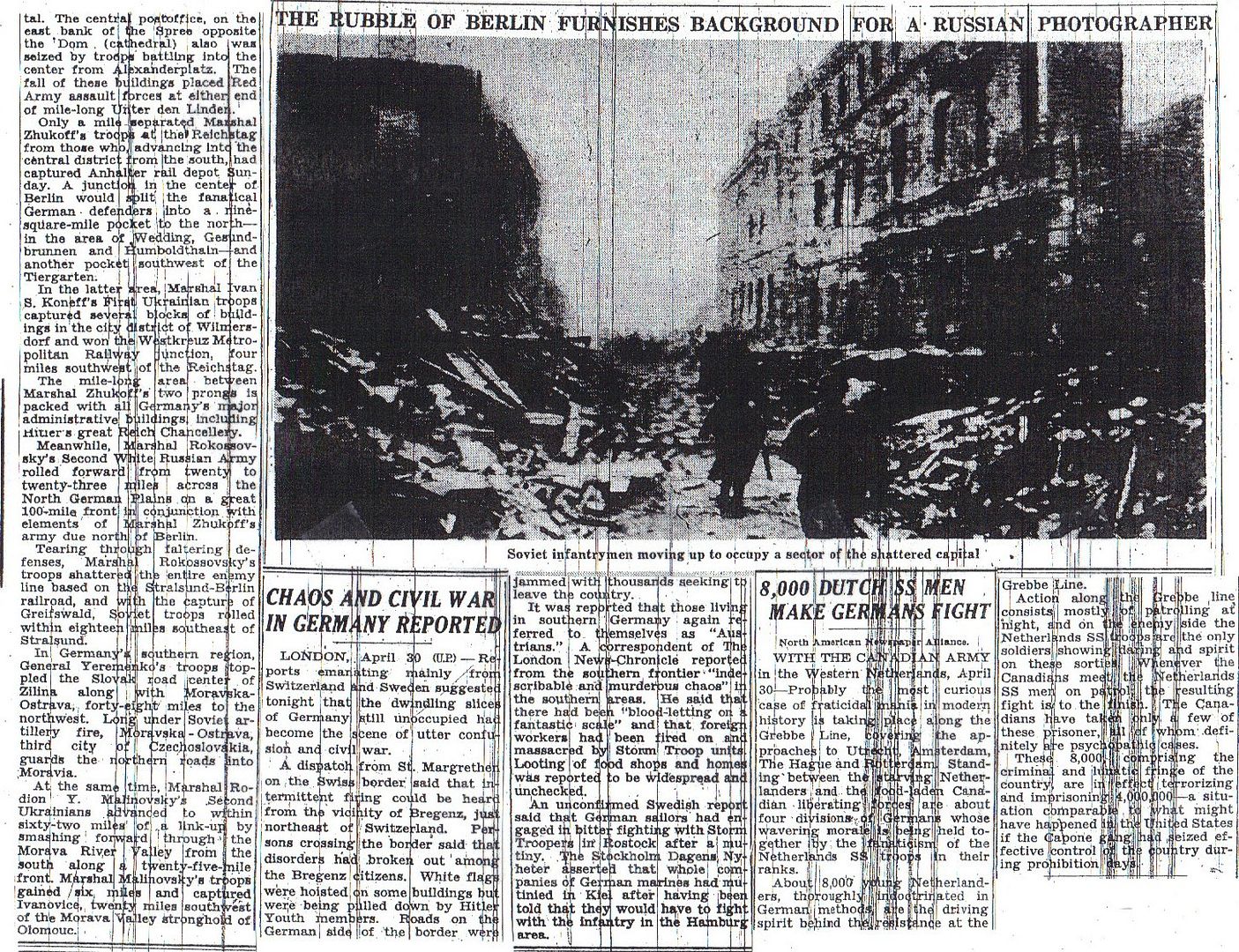
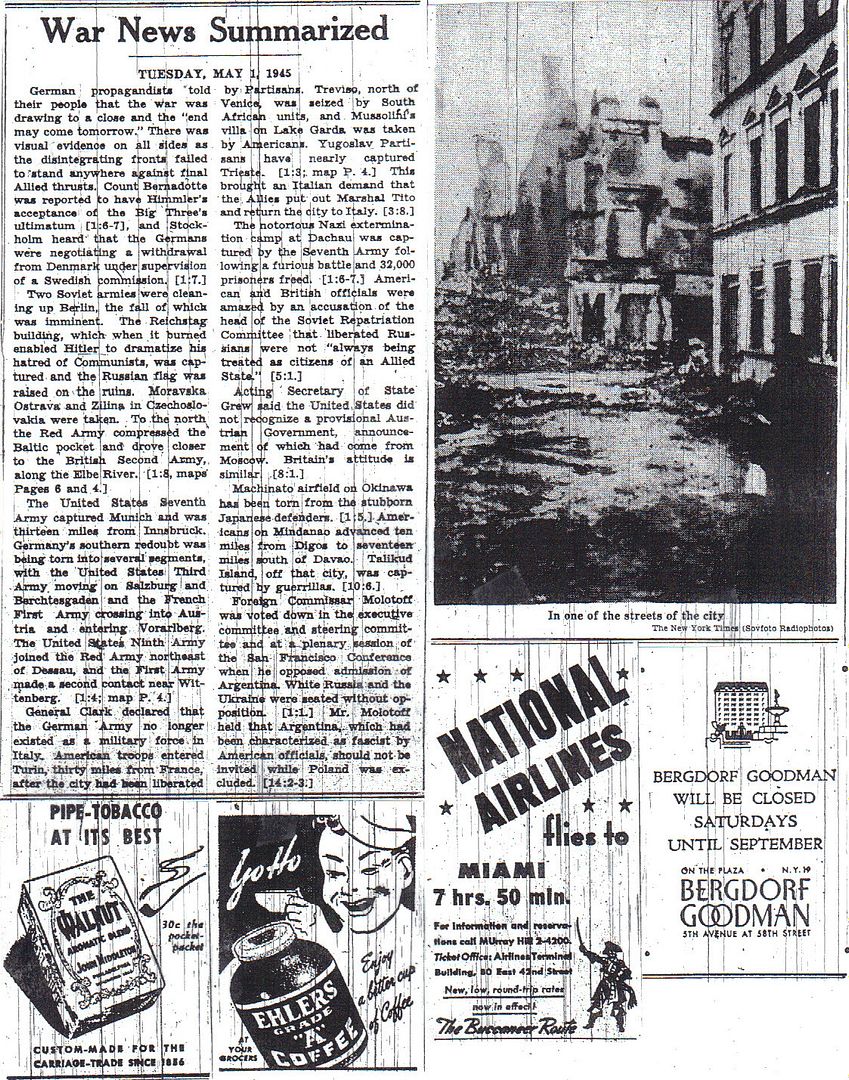
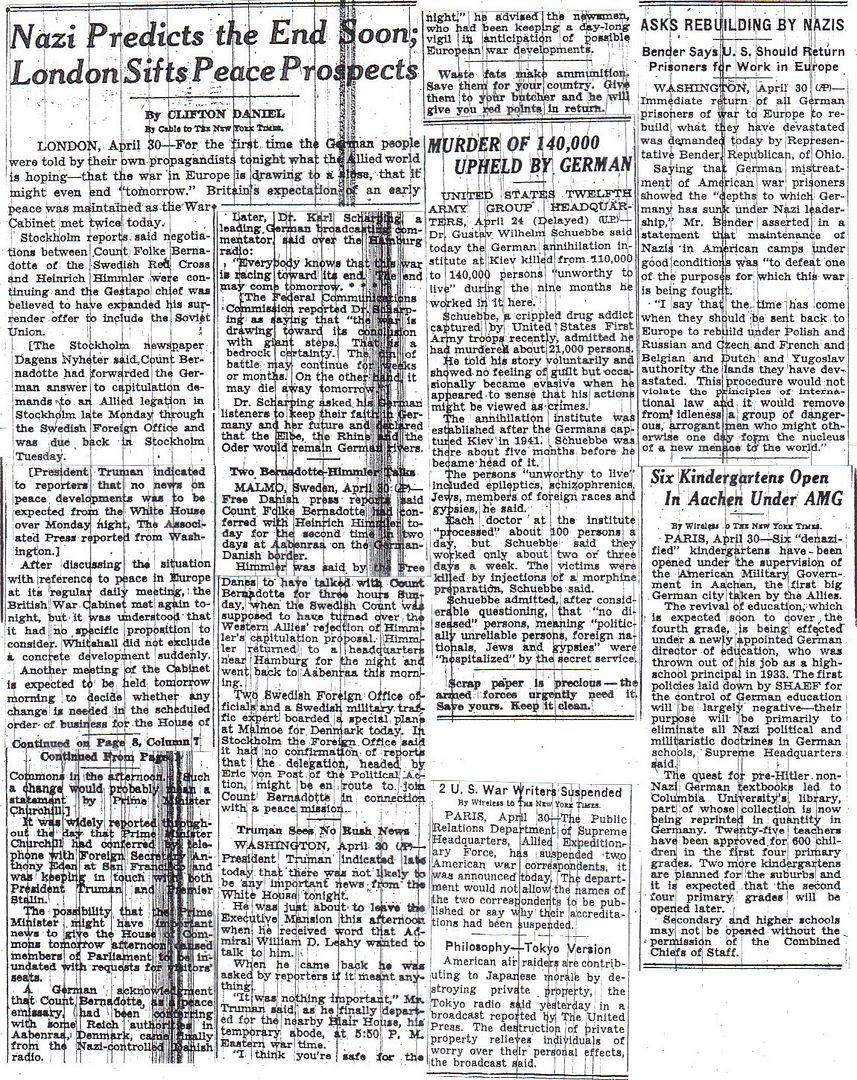
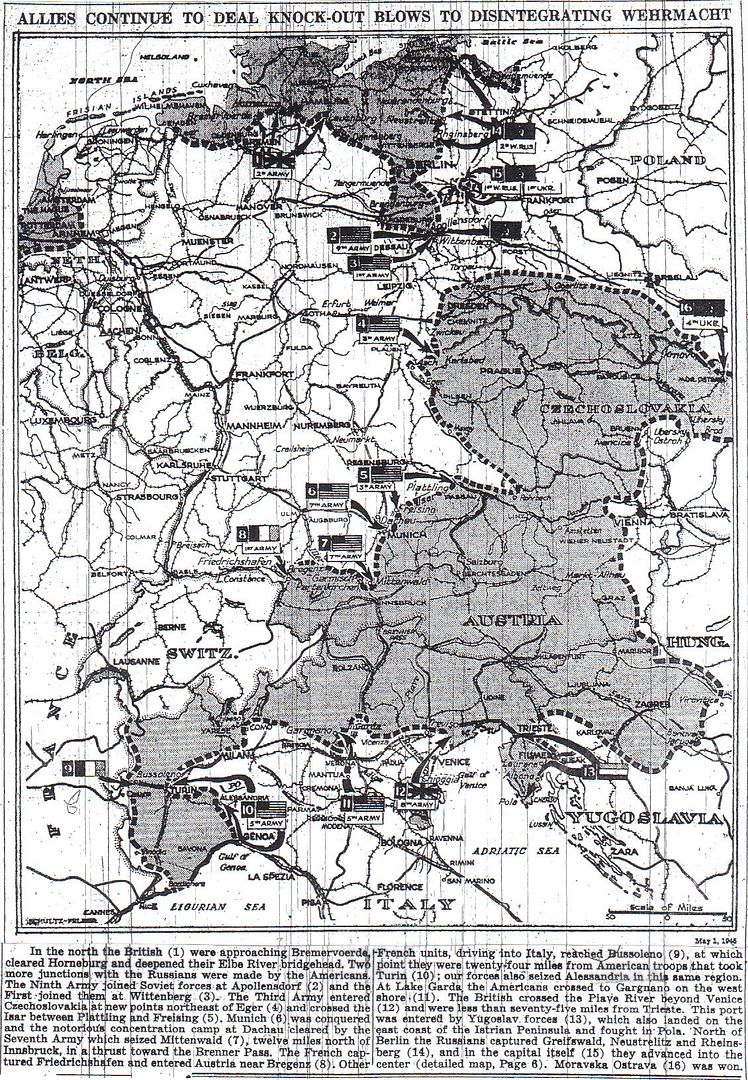
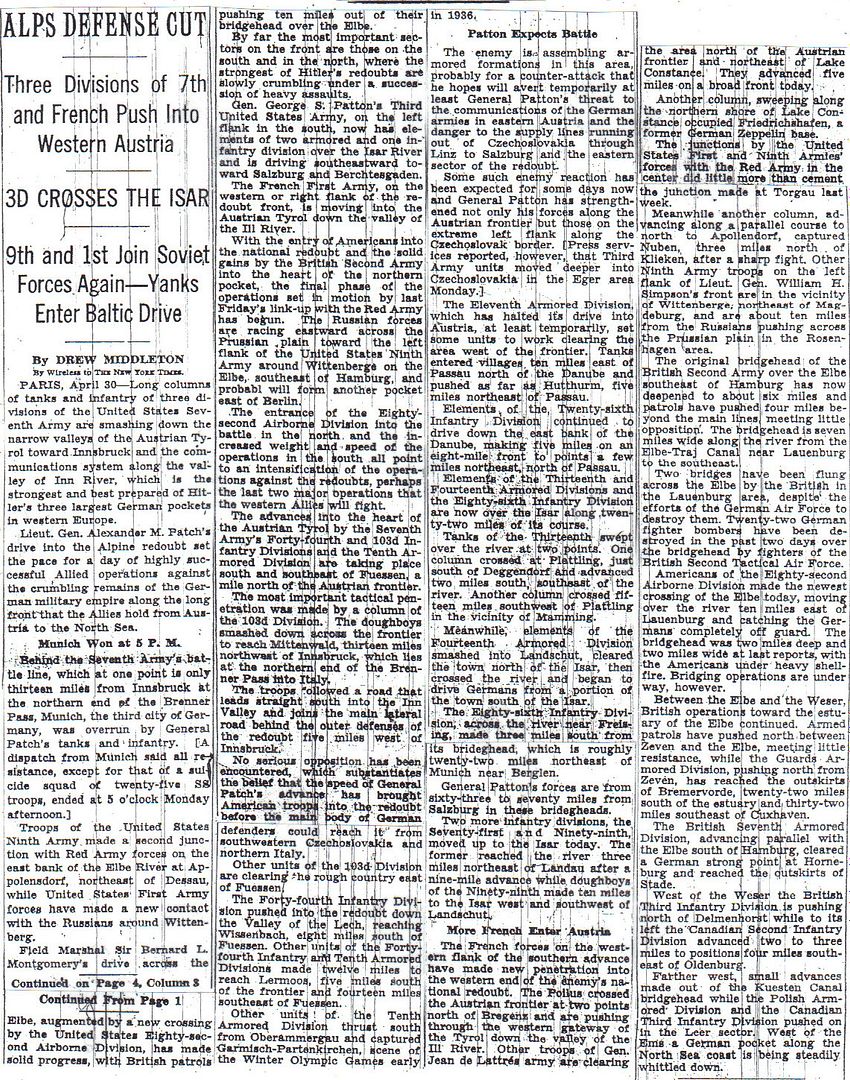
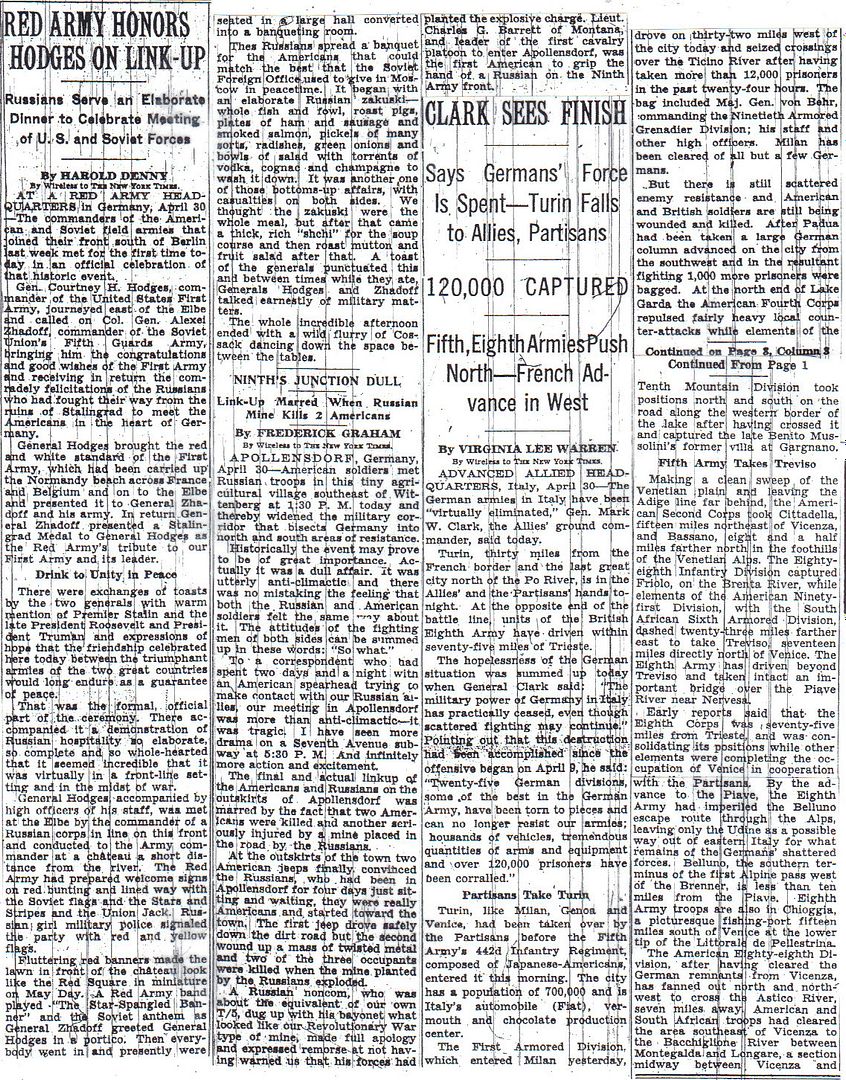
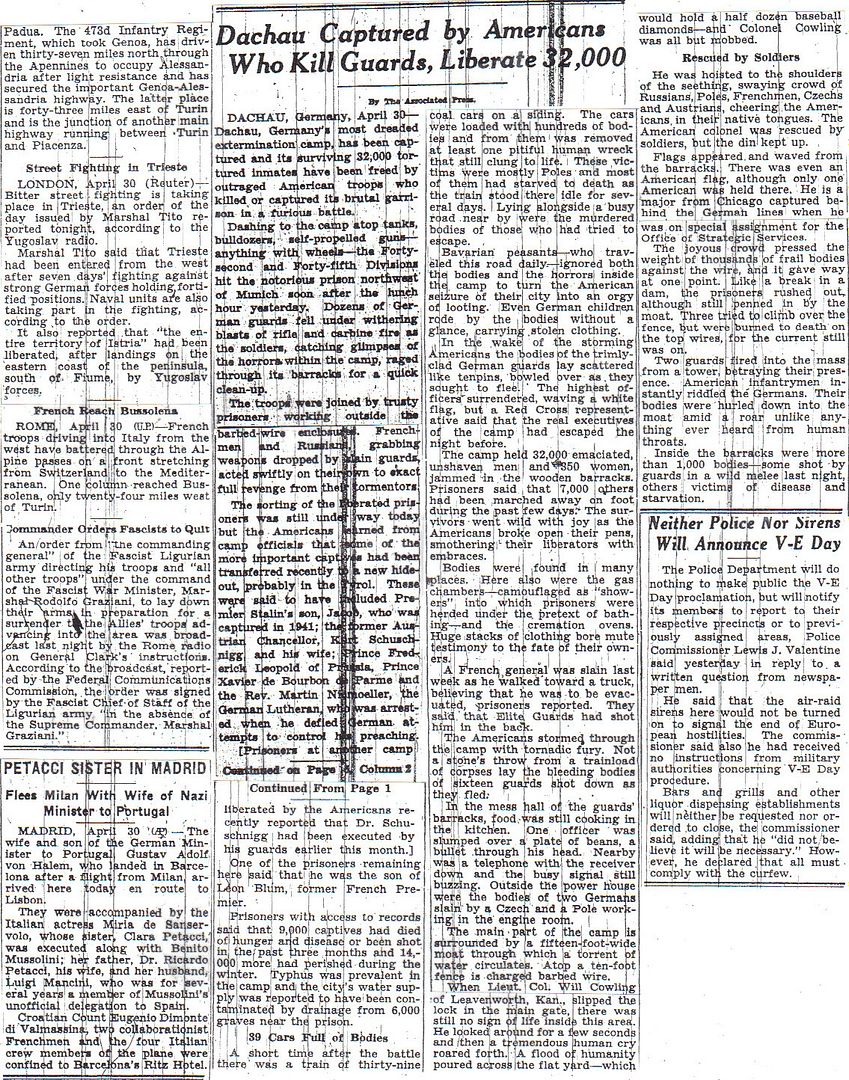
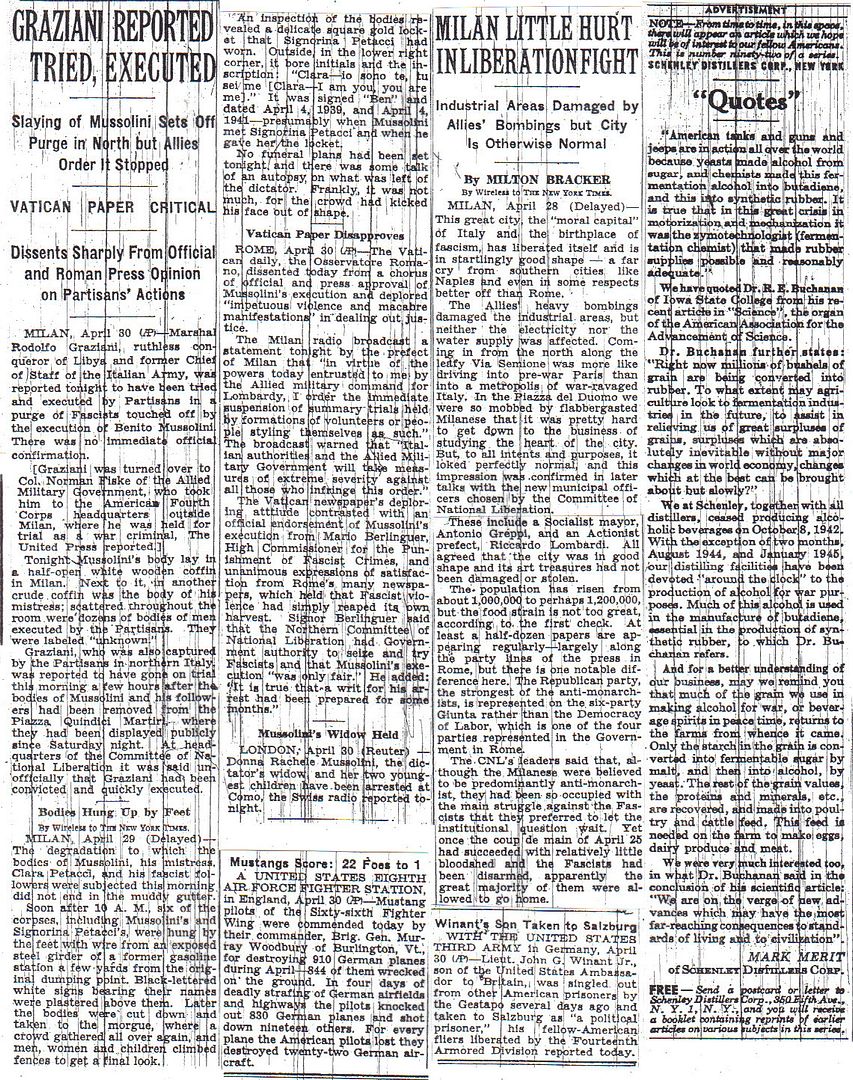
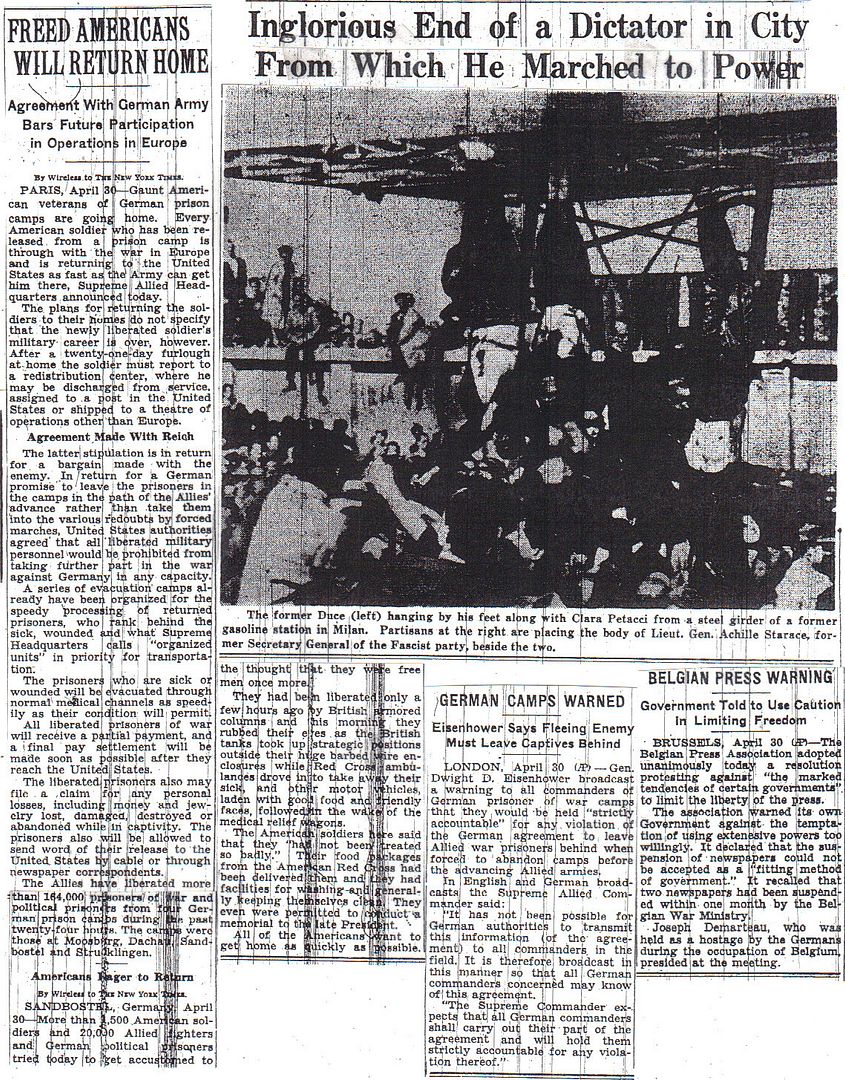
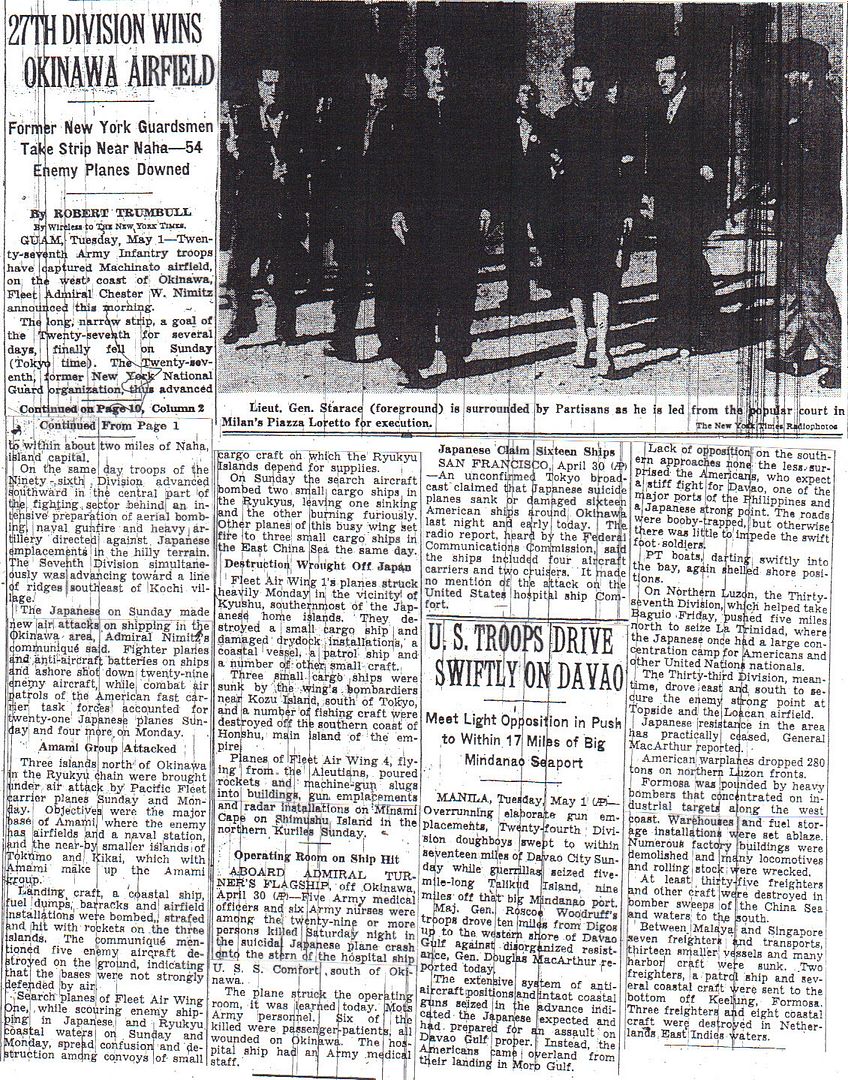
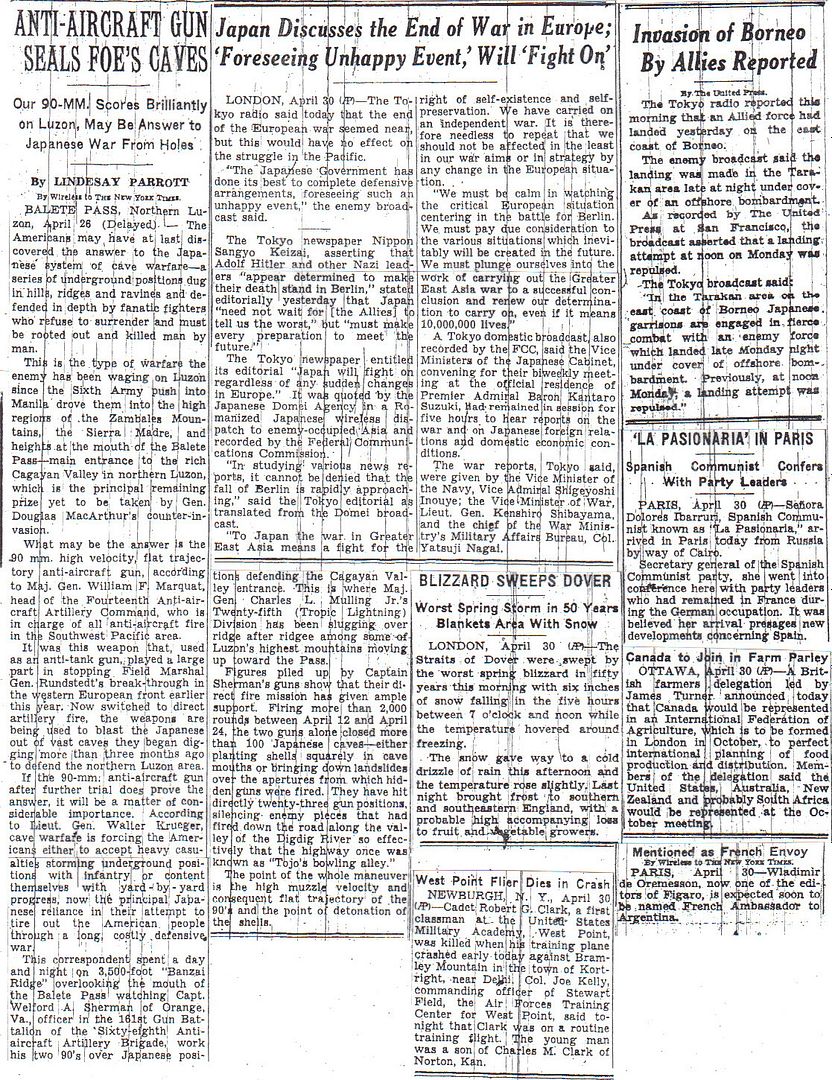
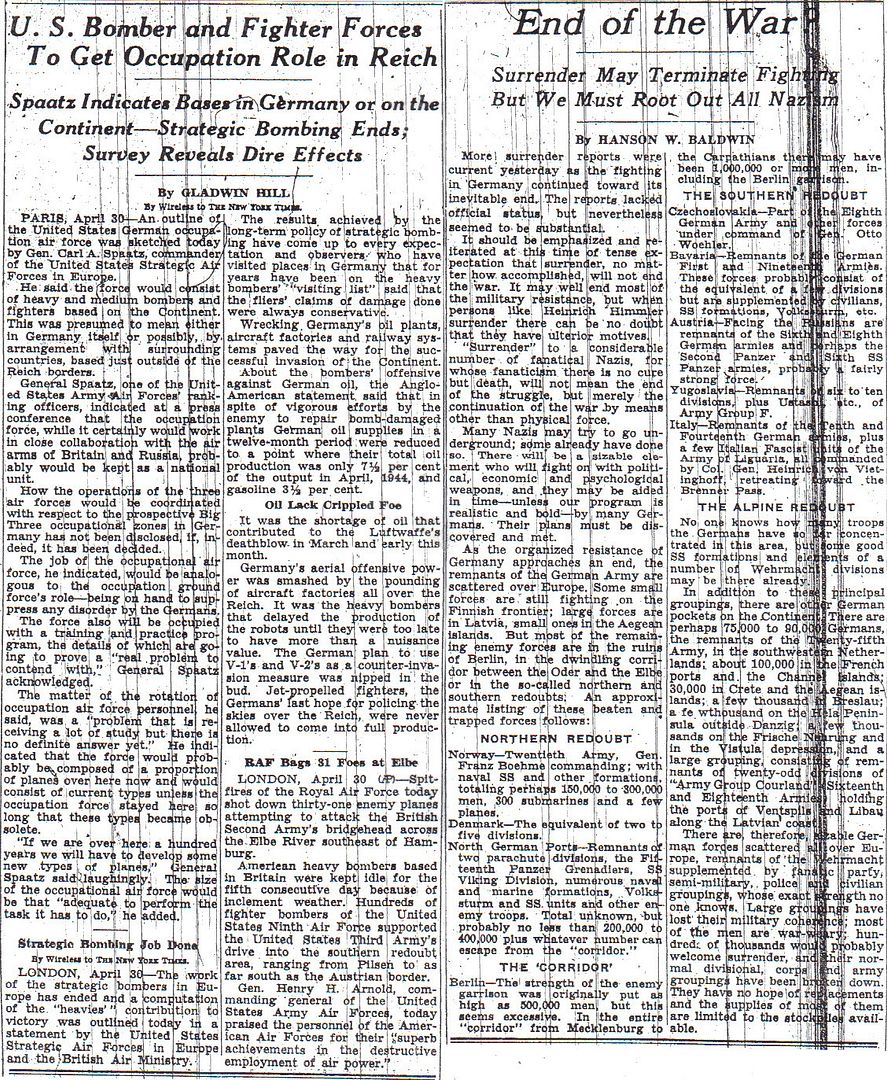
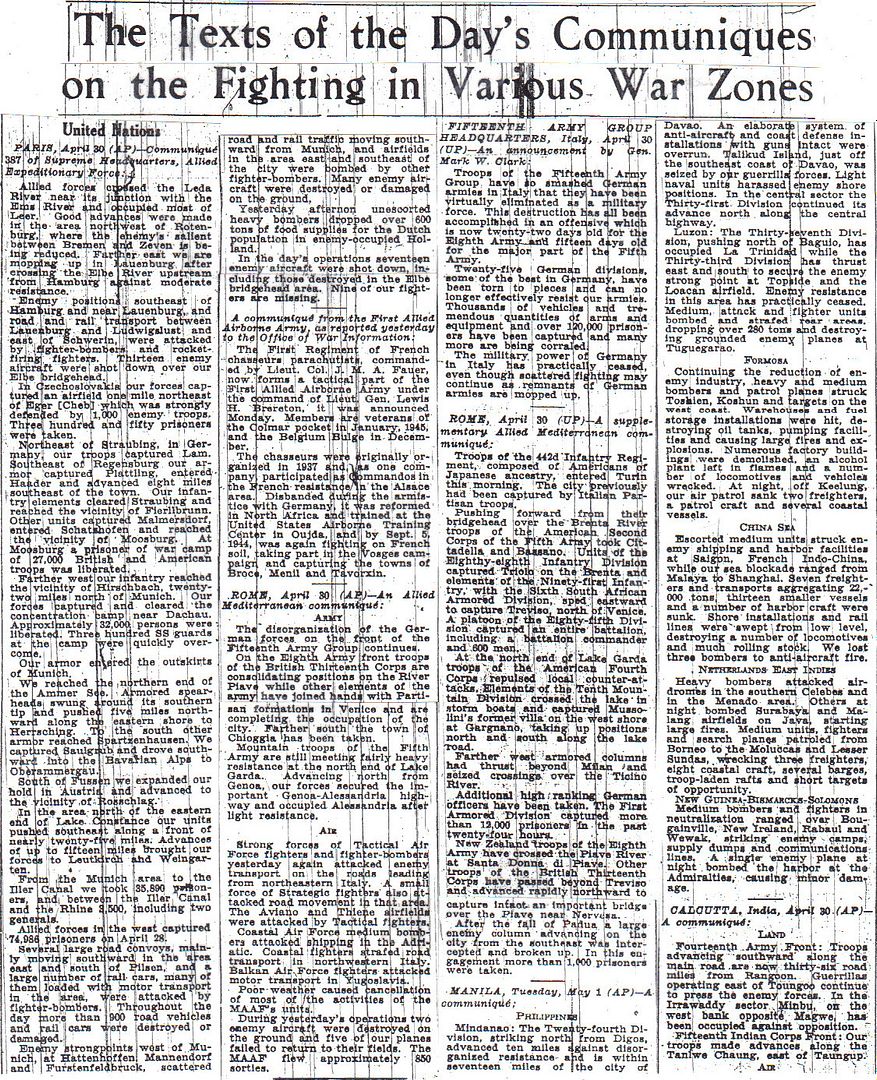
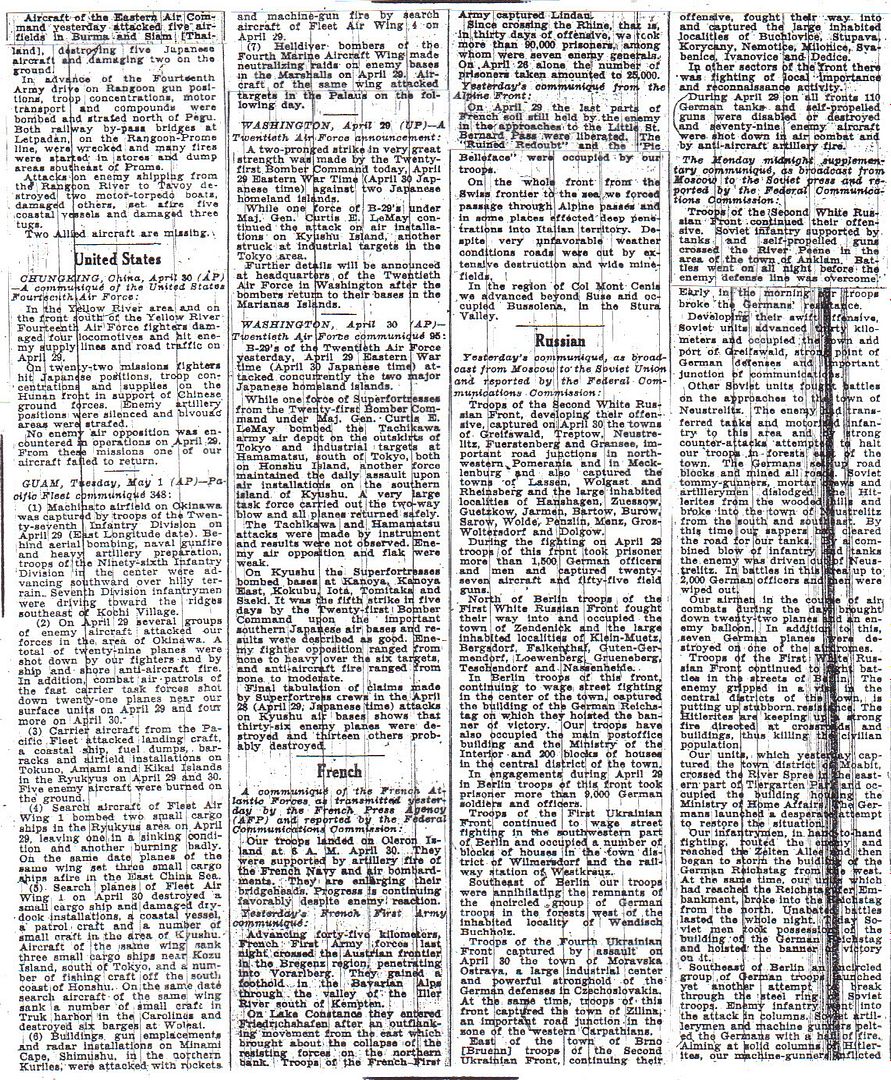
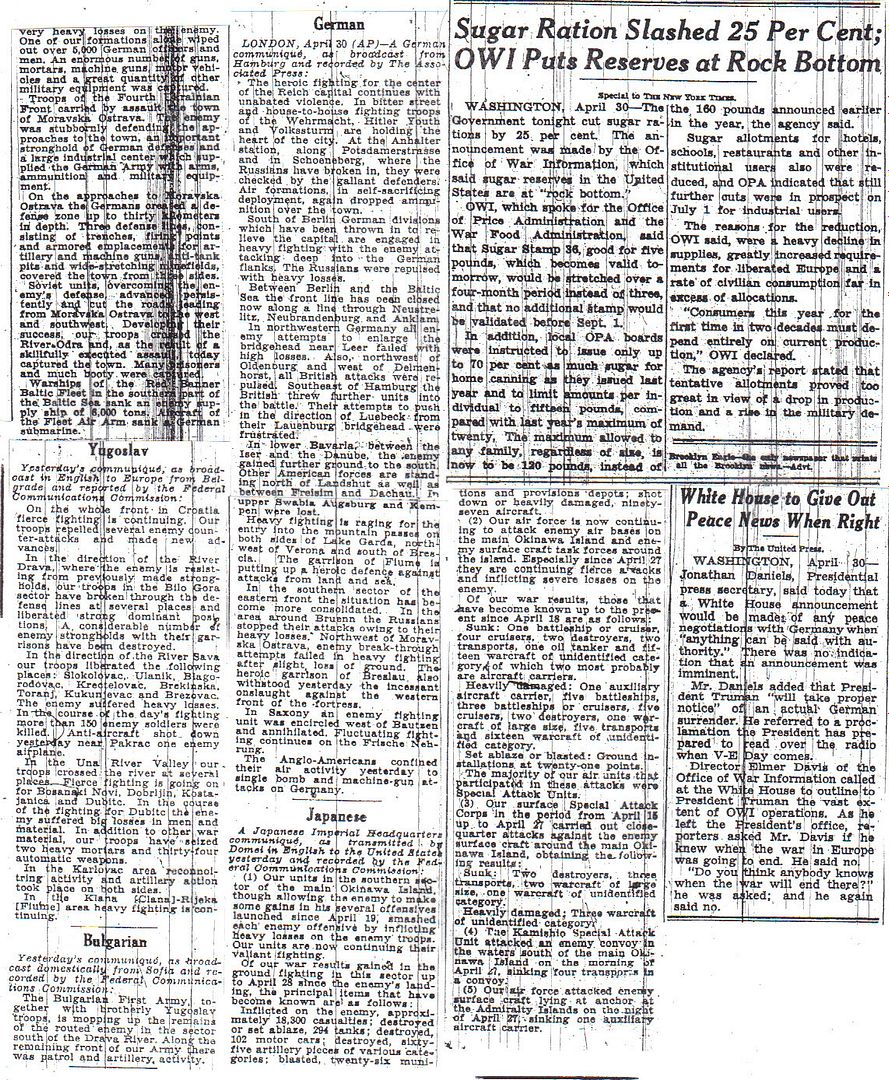
Letter from Hans Spear May 1, 1945
Letter from Hans to Beatrice May 1, 1945. Hans writes about how hard he is working and why he had not written Beatrice in a while.

http://en.wikipedia.org/wiki/Hubert_Zemke
Hub Zemke had quite a story.
Fascinating story. Glad your dad made it back to allied lines okay!
That was my uncle, formerly navigator of a B-17 in the 381st Bomb group of the 8th Air Force. My father carried a rifle with the 128th Infantry Regiment, 32nd ID in New Guinea and Leyte. At this point in the war he is back stateside in the army hospital at Ft. Lewis, Washington.
Thanks for that. What a great American.
Ah. I saw this “my Dad being one of those!” and now realize the narrator was someone else. Anyway, glad for both your uncle and your dad.
I should have clarified that. I found that great site about Stalag Luft I created by the offspring of one of the POWs. I did find my uncle’s name on the alphabetical roster. That might have been provided by one of my cousins, whose email addresses are linked to the name.
Just a reminder of what our boys were fighting for and protecting...

The picture even looks like the Allis-Chalmers my grandfather farmed with in 1945...and continued to farm with right up until he retired in the 1970s...
http://www.evesmag.com/dachau.htm
Dachau, May Day, 1945
By Don Rodda
Until May 1, 1945, I had never heard of a place called Dachau.
After that date more than a half-century ago, I’ve never been able to forget it... Not that anyone should — ever.
Dachau, as we later learned, was Hitler’s first concentration camp which took its name from a nearby town 12 miles from Munich. Only a few days earlier, our troops had taken important cities in the rise of Hitler and the Nazis, Nuremberg and Munich.
On this May Day morning quite unexpectedly I became part of a hastily-organized contingent of soldiers from the 3rd Infantry Division which had fought its way deep into Germany from NorthAfrica via Sicily, Italy, Anzio and Southern France.
None of us knew what this hurry-up mission was about. But since representatives of other attached units were included, I speculated that it might have something to do with our Division newspaper to which I had contributed stories involving men of our ack-ack battalion.
As it soon turned out, no special talents or orientation were required, only eyes to see — Dachau, with its dead, dying, and living skeletons.
Until Allied forces had begun to overrun concentration camps, not much was known about them, certainly not at the ordinary GIs (my) level. Regardless of what anyone may have known, or suspected, about the camps, nothing could have prepared him for the horrors of Dachau.
Our group entered the camp through a railroad siding. The first things we saw were mostly roofless freight cars which, judging from legends painted on their sides, came from towns all over France and Germany. Some of these were World War I vintage “40 and 8s” that originally were designed to carry “Hommes” (Men) 40, and “Chevaux” (Horses) 8. But Hitler’s minions had found other uses for the old cars.
Up ahead, soldiers from our group began climbing the sides of cars to look down into them. I followed suit —and wished I hadn’t. Dead bodies lay in most of the 30 or 40 cars. It appeared that these poor shrunken, emaciated people either died enroute to Dachau, or upon arrival, lacked the strength to drag themselves out of the box-cars.
Some men were almost nude or covered with scraps of clothing. Some lay in convulsed positions on the car floors. Others apparently had wedged themselves in corners of the cars, sitting upright to await the inevitable.
An officer conducting our contingent speculated that this may have been the last trainload of prisoners of the Nazis who had been shipped to Dachau for slave-labor, for medical experimentation, or simply to be eliminated. Historians of what later became known as The Holocaust have said that more than 32,000 Jews and other so-called “enemies of the Reich” were killed at Dachau.
As we moved further into the camp, we saw bodies of prison guards and German soldiers who had been killed when American infantrymen had over-run the camp about 48 hours before our arrival. Some of the defenders, including black-clad SS troops with their lightning insignia, had been tossed into a moat or canal about six feet wide and perhaps two feet deep, which was immediately outside of the camp’s broad compound. Face up or face down, some of the dead soldiers’ blondhair floated eerily in the gently moving stream.
We next approached a large building, outside of which were racks of the striped pajama-like prisoners’ uniforms. All were methodically sorted, jackets and pants, and hung apparently for future use. Nearby was a huge mound of this clothing that hadn’t been sorted.
When we entered this empty building, it appeared to be a large shower room with the usual fixtures near the ceiling. It came as a shock when our guide explained that these fixtures were gas jets by which countless men, women and children met their deaths in the Nazi extermination program.
Our macabre tour progressed to two more large rooms which provided even greater shock because each was packed, literally floor-to-ceiling, with naked dead. Now it was easy to guess where and from whom the pile of unsorted clothing had come.
Everywhere the results of starvation and harsh treatment were obvious. All of the bodies were emaciated. Many had bloody indications as to how these prisoners had met their end. And even in this abattoir, vaunted German efficiency prevailed in that bodies were stacked alternately head-to-toe, seemingly to conserve space and to assure stability.
As I moved out of these rooms as quickly as our single-file permitted, I almost stepped on a human hand which had somehow become extruded into the narrow walkway.
It didn’t seem possible that there were more horrors, but there were, for we had come to the actual crematoria at the end of the building. There were five ovens, or furnaces, each of which was in full use. This day, the cremation was being conducted by, we were told, captured Yugoslav and Russian soldiers supervised by a kapo (prisoner trustee).
We had seen hundreds of dead bodies, and were told many more were to be found elsewhere in the camp and in barracks. Apparently the cremation was continued as a means of removing the bodies, or, because at this early date, no other method had been decided upon.
We were informed that in the three months before the camp’s liberation, 10,000 people had been cremated at Dachau. Every soldier I talked to was glad to get out of these infernal quarters.
A far better sight awaited us outside where thousands of liberated souls were celebrating their new-found freedom and, in many cases, perhaps life itself. These people were assembled on the very ground where Nazi officers and guards once had held the dreaded appell, or roll call, which required prisoners to stand for hours in the bitter cold or under the relentless sun. The camp held an estimated 30,000 inmates at its liberation.
After our dismal walk-through of Dachau, I became convinced that higher authority had decreed Nazi inhumanity and atrocities never should fall into the rumor category so often rampant in military organizations; that soldiers must see these things for themselves.
It may have been our Supreme Commander, Dwight D. Eisenhower, who was responsible for our being at Dachau that May Day. As the camps were being overrun, I read in “Yank” a quote from Ike who said, “I hope every American newspaper will print the story of German bestiality in detail.”
Surely the Herald-Tribune must have because its correspondent, Marguerite Higgins, on Sunday April 29 became the first news person at Dachau, which she entered with soldiers of the 45th Infantry Division.
Now, fifty-odd years later, and despite all that has been written about the infamous camps, there are those who today deny The Holocaust.
But not I... Not anyone who had seen Dachau.
https://www.youtube.com/watch?v=hGZdhfDRBNI
Liberated U.S.prisoners of war burn their former prison compound at Stalag 7A in Moosburg,Germany
Liberated United States prisoners at Stalag 7A in Moosburg, Germany. Repatriated American military prisoners burn buildings at the camp. The camp was overcrowded and included American fliers transferred from the Luft III aviators prison camp, who probably occupy the white tents in the field near the buildings. Several of those fliers are seen sun bathing. Huge fire and smoke seen rising from the burning buildings.
Location: Moosburg Germany
Note: I posted links to this film on a previous thread, not knowing what it was.

General Hans Krebs at Soviet forces headquarters near Berlin on May 1, 1945. Krebs, who had been appointed chief of the army on April 1, 1945, went there in an effort to negotiate the surrender of Berlin, but he was rebuffed by the Russians. Krebs returned to the Führerbunker at the Chancellery, where Hitler had already committed suicide, and he shot himself the following day, May 2.
http://www.myplainview.com/lifestyles/article_25f55f38-b509-11e2-968f-0019bb2963f4.html
Concentration camp survivor recalls May 1, 1945
Gail M. Williams | Herald Lifestyles Editor
Anna Januta, 85, of Plainview remembers the joyful days of her early childhood in Omelanka in the eastern part of Poland close to the Russian border. At that time, she was Anna Chomicz.
“My daddy was a self-supporting farmer,” she said. “There were five children, three girls and two boys. We raised a garden and canned vegetables, made pickles and sauerkraut. There were forests where we found mushrooms and blueberries and dried them. We had a beautiful orchard.
“We worked hard, but we were very happy,” she recalled.
Anna’s family was Catholic and practiced their religion faithfully.
“In the morning, we would wash our faces, kneel down and pray,” she said. Her family said the Our Father and Hail Mary and recited the Apostles’ Creed. During Lent, their home served as a chapel for neighboring families.
Anna and her family needed all their faith when it seemed as though a “dark power” filled the land.
In 1939, Anna was nearing her 12th birthday when Poland was partitioned between Russia and Germany. Omelanka was placed under Russian occupation.
Two years later, in 1941, Germany and Russia were at war.
“It was a time of great political distress,” Januta said.
In 1943, she was staying with a married sister, helping with the children, when the Polish people were evacuated to make room for the Ukrainians who sided with Germany. The people were evacuated and dispersed to various places.
Anna and her sister were put on a crowded transport train headed toward a work camp in Bavaria — Dachau. The 230-trip would ordinarily have taken 18 hours.
“It took two weeks,” Januta said. “They would stop and give us soup. They clipped our hair and powdered our bodies and made us shower.”
Over the years, Dachau housed many political prisoners including Jews, Czechoslovakians, Poles and those considered mentally ill or unstable. Many of them died from various causes and were cremated. Anna, however, was unaware of what was happening in other parts of the camp.
Throughout Bavaria, groups were made to work on farms, in factories and on roads. Anna was assigned to Rosenheim, Bavaria, to work on the railroad.
“We fixed the railroads so they could keep on shipping necessary things to the front,” Januta said. “We were treated like slaves. We lived in barracks with poor food and unsanitary conditions. It was very depressing.”
It got worse when the rains began.
“We couldn’t even dry our clothes overnight before we had to go back to work in the morning.”
A petite woman, Januta has back problems now that her doctors attribute to her labor on the railroads when she was young. Eventually, the hard work made her start hemorrhaging badly, so she was reassigned to a restaurant. By then, she was 17 and cooked from 500 to 600 meals a day.
“Tomorrow (May 1) is a very important day for me,” Januta said last Tuesday.
It was 1945. Bombs had been exploding overhead throughout the night. Then suddenly — silence. Anna and two friends went downstairs from the attic floor of the building they were living in, through a tunnel and out into the street.
There they saw a fully armed American soldier.
“He said ‘Hello, Frauleins.’ Of course, I didn’t understand any English, but he knew we were happy for him. Sixty-eight years since then, I always hope I’ll see the same soldier again and tell him, ‘Thank you for liberating us,’ ” Januta said.
Through the offices of the Red Cross, Januta knew that most of her family was still alive. A 5-year-old niece had died, and her father, who was assigned to a farm in the northern part of Germany, had died following a minor hernia operation.
The rest of the family reunited and returned to school, studying like mad to make up for the time they’d lost. Anna received her education at Ingolstadt and Munich in Germany and began her training as a medical technologist.
Catholic Relief Services helped Anna to move to the United States as a displaced person, the first in her family to come to the U.S.
She got off the boat in Boston, and it struck her: “This is America. This is a free land.”
She started to cry. A policewoman noticed and asked if anything was wrong. Anna said something about the ones she had left behind, but the policewoman seemed to understand that the real reason was happiness and patted her on the shoulder.
Anna went to work at the Franciscan Sisters Maternity Hospital in Columbus, Ohio, on Sept. 2, 1949. About a year later her sister, by then located in San Antonio, became ill and called on Anna to come and help her. Anna went to work at Nick’s Hospital, a large facility where she received certification as a medical technologist.
During this time she met her future husband Mike, who had been a POW in a military camp, Stalag 6. Though both of them had grown up in nearby villages in Poland, the two had never met. They were married in 1952.
Soon after, Januta received a job offer from one of her former colleagues in Plainview, where her services as a medical technologist were needed. After a series of different jobs, Mike became the owner of Mike’s Muffler Shop.
“We’ve been blessed with two married sons, five grandchildren and two great-grandchildren,” Januta said. She is now retired, and Mike has been deceased for seven years.
In Januta’s home is a portrait of the Black Madonna, an important symbol for Polish Catholics.
One of the prisoners in Dachau had packed an icon of the Madonna in the small carry-on they were allowed on the transport. Januta recalls that the icon was set up on the barbed wires surrounding the barracks. She and her fellow prisoners would stand before it and just look at it, or pray, “Good Lord, take care of us.”
Since coming to America, Januta has worked to give back to her new country. She volunteered for FISH and helped to open a hospice, along with other people in the community. A member of St. Alice Catholic Church, she was recognized by the diocese for her charitable work, including making up CARE packages for the people of Rwanda, Central Africa and the Congo.
“People here have been very good to me, and I’m returning the favor by working for good causes,” she said. “I love America very much.”
For Januta, the election of Karl Wojtyla (Pope John Paul II) was a special time.
Throughout history, she said, Poland had been invaded by many groups, and its people were driven off the land by the partition during World War II.
“God selected from the ruins a leader of the church, whose whole teaching was live in peace and don’t have fear,” Januta said.
Appreciate all your fine postings on this era. So much has been lost - so much remains. Thanks again.
I’ve got a search engine and I’m not afraid to use it! :-)
Seriously, I’m glad to do it. I’m getting a lot of it myself.
http://www.yale.edu/lawweb/avalon/imt/document/d-444.htm
ASSUMPTION OF POWER BY DOENITZ, MAY 1, 1945
“German men and women, soldiers of the German armed forces. Our Fuehrer Adolf Hitler is dead. The German people bow in deepest sorrow and respect. Early he had recognized the terrible danger of Bolshevism and had dedicated his life to the fight against it. His fight having ended, he died a hero’s death in the capital of the German Reich, after having led a straight and steady life.
His life was dedicated to the service of Germany. His devotion in the fight against the Bolshevist flood was in the interest not only of Europe but of the entire civilized world. The Fuehrer has nominated me as his successor. Fully conscious of the responsibility, I am taking over the leadership of the German nation in this fateful hour, my first task is to save German men from being destroyed by the advancing Bolshevist enemy. For this reason only do the Armies continue fighting. As far and as long as the achievement of this task is being prevented by the British and Americans, we have to defend ourselves against them too and must go on fighting. Thus the Anglo-Americans are no longer carrying on the fight for their own peoples but only for the spreading of Bolshevism in Europe. What the German people have achieved in this war through fighting and [the] sufferings they have undergone at home are unique in history. In the coming emergency arising for our people I shall to the best of my ability make it my business to secure for our brave women, men, and children the most tolerable conditions essential to life.
In order to do this, I need your help. Give me your confidence, as your road is also my road. Uphold order and discipline in towns and country. Let everybody remain at his post doing his duty. Only thus will we be able to mitigate the suffering, which the future will bring for every one of us, and prevent the collapse. If we do all that is in our power, God will not forsake us after so much suffering and sacrifice.”

Well, not exactly ...
You scooped me. That photo will appear in the New York Times on May 2.
Chowhound Missions
100th Bomb Group Chowhound Missions
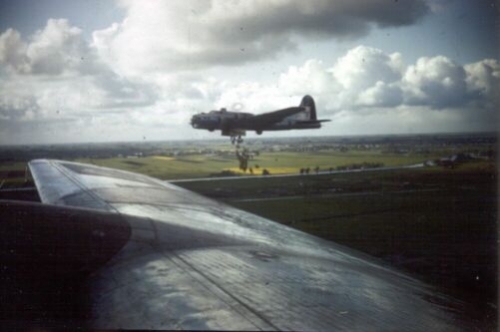
While the sight of big four engine bombers with their bomb bay doors open had previously spread fear and destruction across Fortress Europe, starting May 1, 1945 it meant only manna from heaven was coming to the Dutch people. Facing starvation and in need of immediate assistance while the final details of the surrender of the German forces could be worked out, the Mighty Eighth came to the rescue of the Dutch. The B-17G Flying Fortresses of the 100th Bomb Group dropped tons of food and supplies to the needy of Holland and in doing so, helped save the lives of many. As the children waved and hoped for candy and gum, the mothers and fathers hoped the parcels floating down carried the food they needed to feed their hungry families. Flying a preset course arranged between the Allies and Germans occupying the territory, the Forts came in low and vulnerable (some as low as 200 feet). Even on mercy missions the prospect of mechanical failure at such a low level or overzealous German gunners could not stop losses from happening. Thankfully, the 100th BG did not experience any of these losses, but our sister group, the 95th did.
Many who flew these missions will never forget them and recall them being some of the proudest moments they experienced during the war. We open this section with thanks to all those who helped bring HOPE back to a war torn Europe, and to the people of Holland for never forgetting. We also want to thank Jack O’Leary for sharing many items for display here from his archives.


Dang. I’m so sorry.
Disclaimer: Opinions posted on Free Republic are those of the individual posters and do not necessarily represent the opinion of Free Republic or its management. All materials posted herein are protected by copyright law and the exemption for fair use of copyrighted works.